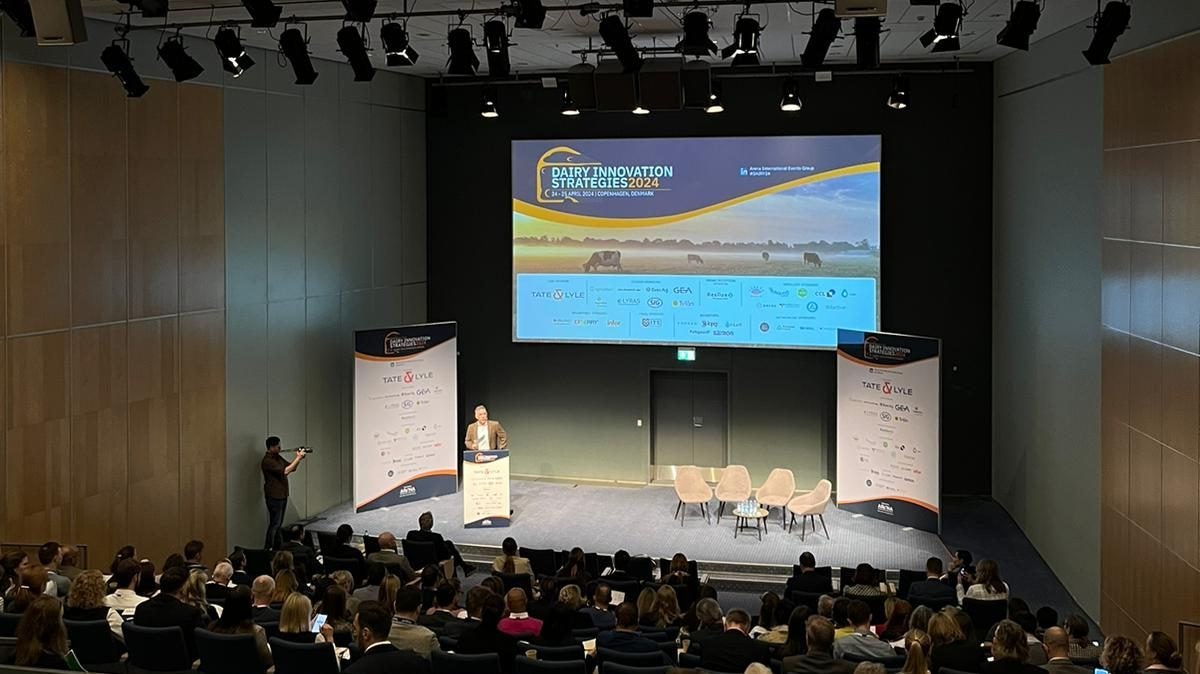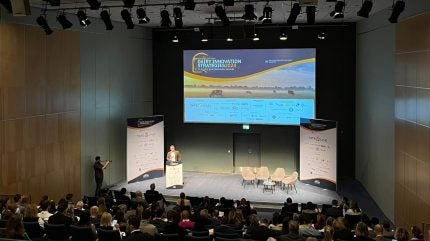

Innovation and sustainability were the main items on the agenda at the recent Dairy Innovation Strategies 2024 conference in Copenhagen with plant-based alternatives increasingly being embraced by an industry that knows it has to be laser-focused on consumer lifestyle choices.
Indeed, representatives from plant-based businesses such as Naturli’ and Oatly spoke at the two-day event organised by Just Food’s sister organisation Arena International Events Group.
Kicking off the conference, Patrik Hansson, CMO of Danish dairy giant Arla Foods, outlined in stark terms the reasons why he believes the sector needs to modernise its messaging to win over consumers.
“The dairy industry hasn’t modernised. It’s still talking about the family breakfast. I’m sorry, that’s gone,” he said.
Finding ways to innovate
The dairy industry, Hansson suggested, needed to work to win over younger consumers.
“How do we get the next generation to enjoy our products? We need to find ways to innovate in a different way to attract the cool kids of the next generation.
Access the most comprehensive Company Profiles
on the market, powered by GlobalData. Save hours of research. Gain competitive edge.

Company Profile – free
sample
Your download email will arrive shortly
We are confident about the
unique
quality of our Company Profiles. However, we want you to make the most
beneficial
decision for your business, so we offer a free sample that you can download by
submitting the below form
By GlobalData
“How do we make all this fun? That’s the way to change the behaviour of consumers.”
In his address to delegates, Hansson said he believes many consumers have lost touch with what food really is “which is to bring you the nutrition your body needs”.
He added: “Eighty per cent of people say they are confused as consumers as to what is healthy or unhealthy food. That is a big, big problem and we need to tackle it as an industry.
“We need to be better at finding a food system to nourish people. Science is pointing in all directions. We need to come together as an industry to find one way of doing this.”
Hansson argued the dairy industry has the tools to tackle some of these problems.
“There is a lot of new knowledge available today. We are sitting on a lot of magic and it’s how we change that into products people want to consume,” he said. “We are talking about dairy 2.0.”
Importantly, Hansson is also keen to see greater collaboration with non-dairy sectors.
“The future will have to see the dairy industry and food industry working in sync with consumers to be culturally relevant,” he said.
The need to collaborate
Thomas Ryan, head of agri-sustainability and customer engagement, at Irish dairy group Tirlán, believes that being relevant in the future has to go hand in hand with being sustainable.
“Collaboration across the supply chain is key to a sustainable future,” he said.
“My view is that there is a need for greater collaboration. We need to have a very mature and open conversation [around these issues] – and an honest discussion on who bears the costs and where.”
Ryan argued dairy companies have to be sustainable as their customers and end consumers are demanding but he also stressed further investment it is the right thing to do.
“COP28 in Dubai prioritised climate and food links for the first time since Cop started in 1995,” he said.
Tirlán, the number one milk processor in Ireland with a 3.2bn litre milk pool, is one of the ten founding companies of Origin Green, sustainability development programme initiated by the Irish government’s food body Bord Bia. The scheme is aimed at establishing Ireland as a world leader in sustainably produced food and drink.
The importance of the dairy and meat industries to the Irish economy means it will be at the heart of the country’s carbon-reduction efforts.
“Some 61% of Ireland [‘s land] is dedicated to agriculture and 81% of that is devoted to grasslands,” Ryan pointed out.
Farm-level emissions
Carrying on the theme of sustainability, Thijs Geijer, senior sector economist food and agriculture at ING Bank, spoke about how net-zero strategies can be a driver for innovation in the dairy industry but, first, he pointed out where the carbon-emission problem lies.
“Approximately 5% of total emissions come from dairy processors in terms of emissions in the dairy value chain,” he said.
“Some 80%-85% of all emissions happen at farms, whether it’s methane, carbon or nitrogen.
Geijer said ING had analysed 30 major dairy companies in relation to their net-zero emissions targets.
“The main finding in terms of targets is that everyone is moving in the same direction but at different speeds,” he said.
He also outlined the bottom line cost of implementing solutions.
“Our analysis shows it could take €5bn to €19bn ($5.40bn to $20.54bn) to achieve the 2030 reduction target for the 30 largest meat and dairy companies. And I think that estimate is quite conservative,” he said. “A number of large dairy companies have set aside €1bn for this purpose.”
Switching to plant-based
With sustainability a key topic at the conference, it was no surprise to see plant-based, alt-dairy businesses featuring prominently.
Lana Lolfing, sustainability manager in the Nordic markets for Oatly, talk about what it sees as a ‘post-milk generation’.
“Around a third of all greenhouse gas emissions globally come from the food system,” she said.
“Some 77% of agricultural land is used for livestock but it only provides 18% of global calorie supply.
“The current food system is driving malnutrition and non-communicable diseases.
“We really need to change the way we eat. Switching to a plant-based diet is one important step on this journey.”
Lolfing told the audience no dairy companies had responded to an Oatly challenge, via its advertising to put details of its climate footprint on its packs.
“We believe being transparent is important in driving change,” she said.
Involving consumers in innovation
Plant-based and innovation go hand-in-hand, of course, and Henrik Lund, CEO of Danish alt-dairy business Naturli’ Foods, gave the audience an insight in how it goes about creating new products.
“Every time we meet our customers we have three new ideas. One might not work but we get shelf space for the other two. If a product doesn’t work we cut it off. We do consumer-driven innovation through 750,000 Naturli’ ambassadors,” he said.
“We ask them what they think of new product ideas. That’s really important for Naturli’ to have this interaction with consumers. Speed to market is also very important and we always aim to get our products into mainstream areas of the store. That is happening in Tesco [the UK supermarket group where it has just won a listing] where our product will be next to the dairy butters and spreads.
“We are relentlessly innovating to bring plants to the people. It’s all about taste and finding the next big new flavours. In Denmark, we have launched Naturli’ spreadable with a soured culture, which delivers on taste and quality. Also, some 60% of milk alternatives are used in coffee so that’s a market we look at. Inspired by visiting the US we have launched Naturli’ Tasty Pumpkin Spice. People have gone crazy for this product. It has sold out, sold out, sold out.”
But Lund said he does not believe the dairy and plant-based industries need to be antagonistic towards each other.
“We focus on our half of the pitch. We want to be partners with the dairy industry. It’s also possible for them to have our products in their own portfolio under their own brand,” he said.
Some resistance to change
But while innovation is expected from alt-dairy companies such as Lund’s, it is sometimes resisted by consumers of traditional dairy companies.
In a case study presentation, Anne Catherine Whist, vice president for R&D at Tine, Norway’s largest dairy company, talked about the company’s experience of launching Future Milk, a product from cows fed the ingredient bovaer, which aims to reduce methane.
“It was all over the newspapers. It was either very positive or people saying you are ruining the purity of Norwegian milk. There were quite diverse responses,” she said.
“Some said it was unnatural and even that it could cause cancer. Some said it was greenwashing.
“But, in a questionnaire, a third of those responding said they gained more knowledge about how Tine works in terms of sustainable Norwegian milk production.”
She concluded: “We need to work together with plant-based companies to solve these problems. It’s not just climate change, it’s about nutrition.”
Game-changing innovation
Drawing conclusions from its recent consumer survey, Mark Dempsey, senior consulting director at GlobalData, the parent company of Just Food and Arena, said that despite setbacks it is important to carry on innovating.
He said: “It’s important to understand what the next stage of innovation is. We need to call out game-changing innovation when we see it.”
Dempsey gave the example of Irish dairy group Kerry’s Smug product range, which is blended oats and dairy.
“Can we give consumers the chance to test out how they might want to change their consumption habits? This could be a true game-changer and is absolutely worth watching,” he said.
He also suggested learnings could be taken from adjacent categories such as the soft drinks industry.
“Every single year since 2000 the amount of sugar and calories has dropped. Yes, it was government regulation but also consumer demand,” he said.
“It allows consumers to make better-for-you choices. Your consumer is expecting this now in an adjacent category.”
The health and well-being message
Echoing Hansson’s point about out-of-date marketing concepts around dairy, Dempsey also stressed the needs of the younger generation must be considered.
“Gen Z is looking for more in-the-house occasions. They want to take time to rest and relax more frequently.”
He said this also links to increased concerns over mental health and an increased interest in health and well-being.
“Research shows the benefits of dairy from an holistic health point of view – mental health, gut health,” he said.
But Dempsey warned that competition could come from outside the sector.
“Alcohol companies are moving into areas such as energy drinks and the soft drinks industry is moving into the alcohol space. There is category blurring,” he said.
Price not the only factor
GlobalData’s research also showed that consumers are still extremely concerned about inflation.
“They are paying more attention to prices. They are switching to cheaper stores or brand alternatives. They are staying with the brands as well but buying fewer items,” Dempsey said.
But he warned: “You can tactically focus on price but a race to the bottom suits nobody.
“We think there should be a balance and absolutely keep investing in innovation. The uniqueness of a product has significant influence on choice.”
On whether dairy businesses should be innovating in the plant-based area, Dempsey said: “Our consumer survey results show that 43% think [dairy] alternatives are healthier and 29% said they are curious about alternatives.
“The consumer is generally more open than ever about buying plant-based.”
Dempsey’s core message was that innovation is key to future success.
“Dairy retail sales are growing by about 4% a year, which is largely tracking the larger food and beverage sector. In foodservice it is ahead of retail for dairy,” he said.
“Think about foodservice and how you might play there. The foodservice industry is seeing some of the best innovation and expansion.”
He gave the example of China’s tea drink chain Hey Tea, which has just opened an outlet in London and which sells cheese tea.
He also highlighted the story behind a company is important. “Younger consumers want to understand the fundamentals of how you do business,” he said.
“Absolutely focus on health and well-being in this category. These are key drivers and motivators for your consumers.”

